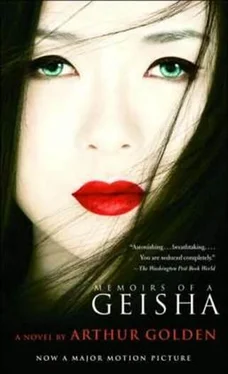I worked very hard during those years. But every night when I went to bed, I thought of Gion. All the geisha districts in Japan had reopened within a few months of the surrender; but I wasn’t free to go back until Mother summoned me. She was making quite a good living selling kimono, artwork, and Japanese swords to American soldiers. So for the time being, she and Auntie remained on the little farm west of Kyoto where they had set up shop, while I continued to live and work with the Arashino family.
Considering that Gion was only a few kilometers away, you may think I visited there often. And yet in the nearly five years I lived away, I went only once. It was one afternoon during the spring, about a year after the end of the war, while I was on my way back from picking up medicine for little Juntaro at the Kamigyo Prefectural Hospital. I took a walk along Kawaramachi Avenue as far as Shijo and crossed the bridge from there into Gion. I was shocked to see whole families crowded together in poverty along the river’s edge.
In Gion I recognized a number of geisha, though of course they didn’t recognize me; and I didn’t speak a word to them, hoping for once to view the place as an outsider might. In truth, though, I could scarcely see Gion at all as I strolled through it; I saw instead only my ghostly memories. When I walked along the banks of the Shirakawa Stream, I thought of the many afternoons Mameha and I had spent walking there. Nearby was the bench where Pumpkin and I had sat with two bowls of noodles on the night I asked for her help. Not far away was the alleyway where Nobu had chastened me for taking the General as my danna . From there I walked half a block to the corner of Shijo Avenue where I’d made the young delivery man drop the lunch boxes he was carrying. In all of these spots, I felt I was standing on a stage many hours after the dance had ended, when the silence lay as heavily upon the empty theater as a blanket of snow. I went to our okiya and stared with longing at the heavy iron padlock on the door. When I was locked in, I wanted to be out. Now life had changed so much that, finding myself locked out, I wanted to be inside again. And yet I was a grown woman-free, if I wished, to stroll out of Gion at that very moment and never come back.
* * *
One bitter cold afternoon in November, three years after the end of the war, I was warming my hands over the dye vats in the annex when Mrs. Arashino came down to say that someone wished to see me. I could tell from her expression that the visitor wasn’t just another of the women from the neighborhood. But you can imagine my surprise when I reached the top of the stairs and saw Nobu. He was sitting in the workshop with Mr. Arashino, holding an empty teacup as though he’d been there chatting for some time already. Mr. Arashino stood when he saw me.
“I have some work in the next room, Nobu-san,” he said. “You two can stay here and talk. I’m delighted you’ve come to see us.”
“Don’t fool yourself, Arashino,” Nobu replied. “Sayuri is the person I’ve come to see.”
I thought this an unkind thing for Nobu to have said, and not at all funny; but Mr. Arashino laughed when he heard it and rolled the door of the workshop closed behind him.
“I thought the whole world had changed,” I said. “But it can’t be so, for Nobu-san has stayed exactly the same.”
“I never change,” he said. “But I haven’t come here to chat. I want to know what’s the matter with you.”
“Nothing is the matter. Hasn’t Nobu-san been receiving my letters?”
“Your letters all read like poems! You never talk about anything but ‘the beautiful, trickling water’ or some such nonsense.”
“Why, Nobu-san, I’ll never waste another letter on you!”
“I’d rather you didn’t, if that’s how they sound. Why can’t you just tell me the things I want to know, such as when you’re coming back to Gion? Every month I telephone the Ichiriki to ask about you, and the mistress gives some excuse or other. I thought I might find you ill with some horrible disease. You’re skinnier than you were, I suppose, but you look healthy enough to me. What’s keeping you?”
“I certainly think of Gion every day.”
“Your friend Mameha came back a year or more ago. Even Michizono, as old as she is, showed up the day it reopened. But no one has been able to tell me why Sayuri won’t come back.”
“To tell the truth, the decision isn’t mine. I’ve been waiting for Mother to reopen the okiya. I’m as eager to get back to Gion as Nobu-san is to have me there.”
“Then call that mother of yours and tell her the time has come. I’ve been patient the past six months. Didn’t you understand what I was telling you in my letters?”
“When you said you wanted me back in Gion, I thought you meant that you hoped to see me there soon.”
“If I say I want to see you back in Gion, what I mean is, I want you to pack your bags and go back to Gion. I don’t see why you need to wait for that mother of yours anyway! If she hasn’t had the sense to go back by now, she’s a fool.”
“Few people have anything good to say about her, but I can assure you she’s no fool. Nobu-san might even admire her, if he came to know her. She’s making a fine living selling souvenirs to American soldiers.”
“The soldiers won’t be here forever. You tell her your good friend Nobu wants you back in Gion.” At this, he took a little package with his one hand and tossed it onto the mats next to me. He didn’t say a word afterward, but only sipped at his tea and looked at me.
“What is Nobu-san throwing at me?” I said.
“It’s a gift I’ve brought. Open it.”
“If Nobu-san is giving me a gift, first I must bring my gift for him.”
I went to the corner of the room, where I kept my trunk of belongings, and found a folding fan I’d long ago decided to give to Nobu. A fan may seem a simple gift for the man who’d saved me from life in the factories. But to a geisha, the fans we use in dance are like sacred objects-and this wasn’t just an ordinary dancer’s fan, but the very one my teacher had given me when I reached the level of shisho in the Inoue School of dance. I’d never before heard of a geisha parting with such a thing-which was the very reason I’d decided to give it to him.
I wrapped the fan in a square of cotton and went back to present it to him. He was puzzled when he opened it, as I knew he would be. I did my best to explain why I wanted him to have it.
“It’s kind of you,” he said, “but I’m unworthy of this gift. Offer it to someone who appreciates dance more than I do.”
“There’s no one else I would give it to. It’s a part of me, and I have given it to Nobu-san.”
“In that case, I’m very grateful and I’ll cherish it. Now open the package I’ve brought you.”
Wrapped inside paper and string, and padded with layers of newspaper, was a rock about the size of a fist. I’m sure I was at least as puzzled to receive a rock as Nobu must have been by the fan I’d given him. When I looked at it more closely, I saw it wasn’t a rock at all, but a piece of concrete.
“You have in your hand some rubble from our factory in Osaka,” Nobu told me. “Two of our four factories were destroyed. There’s a danger our whole company may not survive the next few years. So you see, if you’ve given me a piece of yourself with that fan, I suppose I’ve just given you a piece of myself as well.”
“If it’s a piece of Nobu-san, then I will cherish it.”
“I didn’t give it to you to cherish. It’s a piece of concrete! I want you to help me turn it into a lovely jewel for you to keep.”
“If Nobu-san knows how to do such a thing, please tell me, and we’ll all be rich!”
Читать дальше












